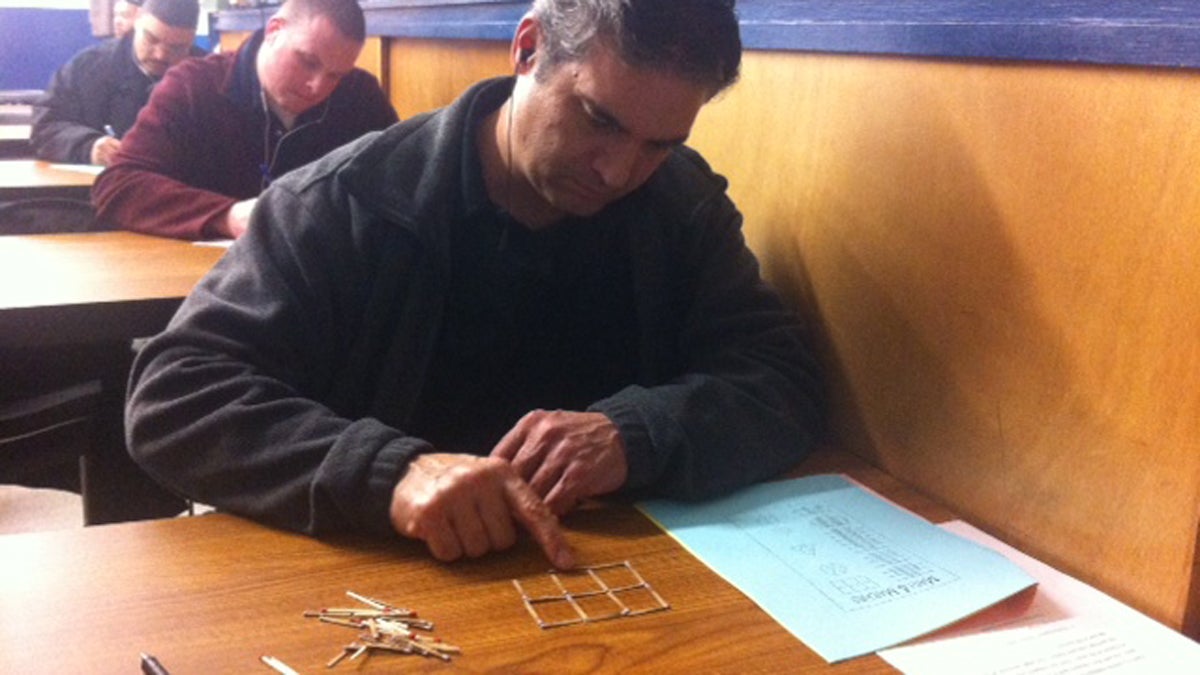Philly settles suit over suicidal man’s death, continues police crisis training
Listen
(Sarah Whiteskoditsche/for NewsWorks)
The city of Philadelphia has settled a lawsuit brought by the mother of a suicidal man shot in March of 2011 by police officers sent to save his life.
When police found 29-year-old Carmelo Winans, he was sitting on the kitchen floor of his father’s home in Northern Liberties, holding a steak knife to his neck and a fork pressed into his chest. He was rocking back and forth muttering, “Jesus loves me, I love Jesus,” and “Oh, Jesus. Oh, Jesus, get me more crack.”
According to Alan Yatvin, the lawyer for Winans’ mother, Bernadette, it was a volatile situation.
“Mr. Winans was suffering from some kind of psychological problem … he was clearly upset, his father described him as paranoid,” said Yatvin.
Officers Richard Nicoletti and Matthew McCarthy, who couldn’t get a response from Winans, thought he might be high on drugs. They called for an officer with a Taser gun and Officer Jill Kerstetter arrived on the scene shortly.
“As she was entering the kitchen … Officer Nicoletti jumped on Mr. Winans. If you believe the officer’s version, the reason he did that is Mr. Winans was cutting his throat with a knife and there was a small cut to his throat,” said Yatvin.
“If you believe the father, Mr. Santiago, he had put down the knife and Officer Nicoletti was jumping on him to secure the knife,” he added.
In the struggle between Nicoletti and Winans, the officer’s gun discharged. Thinking his colleague had been shot, McCarthy fired twice at Winans who died as his father watched.
The lawsuit alleged willful police misconduct, unreasonable use of force and failure of police to follow established policies. It also claimed the city failed to properly train, supervise, monitor and discipline police officers prior to March of 2011.
The case arising from the shooting of Winans settled for an aggregate amount of $405,000, Yatvin said. Lawyers for the city and representatives of the Fraternal Order of Police declined comment.
Humanizing those in psychological distress
In 2007, Philadelphia police launched a Crisis Intervention Team in partnership with area mental health advocates after a series of violent confrontations between the police and mentally ill. In 2000, for example, an officer shot and killed a 45-year-old homeless man in Amtrak’s 30th Street Station after the man lunged at him with a metal chair.
The CIT training is intended to help police de-escalate crises, especially those involving people with mental illness. It’s held at the Police Academy in North Philadelphia where, on a recent day, officers completed routine tasks while listening to recordings of voices, such as those a person in psychological distress might hear.
Some officers played bingo, while others sat at tables, tracing patterns with toothpicks. And other officers attempted to answer basic questions while hearing the voices.
Crisis intervention is about humanizing people in psychological distress, said Capt. Francis Healy, who oversees the CIT program.
“If you learn how to actually listen to people, how to know what’s going on, you can use a lot of the information they are providing to you, and actually start to have a conversation,” he said.
The Philadelphia training is based on “The Memphis Model,” a program developed in the late 1980s. So far, 1,900 of Philadelphia’s 6,600 officers have been trained, said Arthur Evans, commissioner of the city’s Department of Behavioral Health.
“When a person is experiencing psychiatric distress, one of the things they do is that they don’t respond to you appropriately. They either ignore you or they can become combative,” Evans said. “So that’s a really high-risk situation for a person who has a psychiatric illness.
“When the person that they are responding to is an armed law enforcement officer who is trained to be in control,” he said.
According to Evans, the program is working.
“While we don’t have data, we have lots of good anecdotes, where officers have talked people down who are suicidal, for example,” he said. “Situations, I think, where officers are responding to people much more effectively.”
Once trained, CIT officers are permitted to carry Tasers. These officers know when to intervene and how to take a leadership role in crises, said Healy.
Questions of timing
Attorney Yatvin wondered why McCarthy and Nicoletti, who has been named in another suit alleging excessive force, didn’t give Kerstetter, the CIT-trained officer, more time to help Winans.
“Officer Kerstetter was right there. She had a Taser, she was able to deal with the situation,” he said.
According to Yatvin, depositions from McCarthy and Nicoletti reveal they were unfamiliar with basic police protocol for dealing with people in crisis, including those in psychological distress. Yet all officers are supposed to follow rules and basic training for crises situations.
“Time is of no importance,” when dealing with a person in psychological distress, states Police Department Directive 136, part of the department’s rules for all officers.
“Even if you have a written policy, and on paper the policy is great, if you are not implementing it, training on it and enforcing it, it’s just a piece of paper,” said Yatvin.
This story has been updated with the amount of the aggregate settment.
WHYY is your source for fact-based, in-depth journalism and information. As a nonprofit organization, we rely on financial support from readers like you. Please give today.

